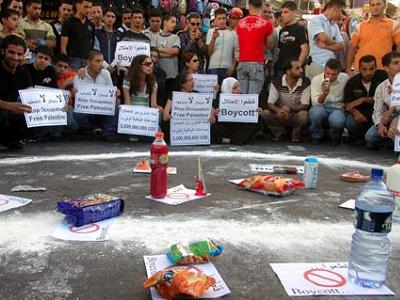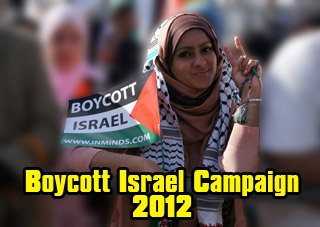
 Innovative Minds © 2014. All Rights Reserved. www.inminds.co.uk | ||||||||||||||
Boycott puts the squeeze on Jewish settlersOmar Karmi, The National The man selling watermelons on the main road from Ramallah to the Qalandiya military checkpoint had clearly worked on his sales pitch.  Palestinians boycott settlement goods “These are Arab watermelons,” he said with some feeling. He pointed to the sticker on the melons, which, although it boasted an Israeli mobile phone number, was written in Arabic. “These are not Jewish,” he said. “And they are sweet.” He might well emphasise their origin. Last month, the Palestinian Authority (PA) seized and destroyed several tonnes of watermelons in Hebron that had been grown in surrounding Jewish settlements. The confiscations came as part of the PA’s drive to ban goods originating in settlements from reaching the Palestinian market. The boycott is picking up steam. The drive is in part a belated implementation of a 2005 council of ministers decision that prohibited the entry of any goods produced, manufactured or packaged in settlements. That decision was reaffirmed in June of last year, but it was not until November that the first confiscations took place. Confounding some sceptics, however, the confiscations have continued and even seen the participation of several senior officials, including Salam Fayyad, the prime minister. Combined with a more aggressive public relations campaign, the PA is now broadening the boycott.
Settlement products command a 15 per cent share of the Palestinian market, a trade worth US$600 million a year. By banning settlement goods, the PA hopes that not only will the settlement economy be harmed, the market share for domestic goods, currently at 18 per cent, will increase and with it employment.
On April 28, the government announced that it would ban the sale of prepaid phone cards for Israeli mobile operators in shops in its jurisdiction. And, on Tuesday, Hassan Abu Libdeh, the minister of national economy, said new legislation signed into law last month by Mahmoud Abbas, the PA president, would also make it illegal for Palestinians to work in settlements from the end of 2011. Officials cite several reasons for the boycott. One, as stipulated by Ismail Dweiq, the minister of agriculture, speaking at a workshop on Tuesday inside the Red Crescent building in front of which the watermelon man was hawking his goods, was to “weaken the settlements and their economy”. Palestinians long ago identified settlements, many built on private Palestinian land, all of them illegal under international law, as one of the core obstacles to finding any political solution with Israel. Continued construction in settlements, including in East Jerusalem, has for months held up the resumption of negotiations between Israel and the Palestinians. That such a construction freeze was not written into the 1993 Oslo Accords that launched the Palestinian-Israeli peace process is still a cause of regret among Palestinian officials, who finger the doubling of the number of Jewish settlers in occupied territory since then as the main reason the Oslo process failed. There is also an important economic dimension. Figures are not accurate since Israel makes no distinction between products made in settlements and those produced elsewhere, but the ministry of national economy estimates that settlement products command a 15 per cent share of the Palestinian market, a trade worth US$600 million (Dh2.2 billion) a year. By banning settlement goods, the PA hopes that not only will the settlement economy be harmed, the market share for domestic goods, currently at 18 per cent, will increase and with it employment, helping to absorb some of the 25,000 Palestinians working in settlements, as well as putting some of the 200,000 unemployed West Bank Palestinians to work. Israel has been none too impressed. Danny Ayalon, the deputy foreign minister, who described the boycott as “one of the more important issues” the Israeli foreign ministry was dealing with, accused the PA of “incitement” and of harming the negotiations process. Writing in the liberal Haaretz newspaper yesterday, Karni Eldad, a settler and daughter of Arie Eldad, a far-right member of the Israeli parliament, called the boycott a violation of the Paris Protocols, the economic accords signed in the context of the Oslo process. She suggested that Israel should retaliate by withholding money lost to the boycott from tax revenue gathered by Israel on behalf of the PA. Palestinians reject the suggestion that the boycott violates the Paris protocols. In his talk on Tuesday Mr Dweiq said it was Israel, by preventing Palestinian goods access to the Israeli market, which was in violation. The Israeli reaction suggests that the boycott could have a significant impact, said Nahed Freij, the project manager with Intajuna, an organisation that seeks to promote local products in the Palestinian market. “A five per cent swing towards fast-moving Palestinian products like cleaning materials and foods could create tens of thousands of jobs. This could be a significant move.” One fear, Ms Freij said, is that the boycott would prove to be political sloganeering rather than a serious campaign and eventually fizzle out. There are also practical obstacles, she said. Palestinian consumers rely on Israeli products for several key needs, especially fresh produce. Seventy-five per cent of all fruit consumed by Palestinians is grown in Jordan Valley settlements, where Jewish farmers, using Palestinian labour and West Bank water resources, reap profits from a combination of Israeli government subsidies and sales to the Palestinian market. But Palestinian producers are not necessarily equipped to pick up the slack, and there continues to be a “perception problem” among Palestinian consumers that Israeli goods are of better quality. The PA, said Ms Freij, needs to set and enforce proper standards, while adjusting their own procurement and tender policies to give local companies a chance to compete. Producers, meanwhile, need to market their products better and raise their quality. Consumers will follow, she said. “It is time for Palestinian products to stand up and be counted. And it’s time for Israel to understand that Palestinian consumers have some power as well.” Source: http://www.thenational.ae/apps/pbcs.dll/article?AID=/20100506/FOREIGN/705059847/1011/NEWS Related ArticlesAlso Of InterestPage URL: http://inminds.com/article.php?id=10375
|
|
Support Us
If you agree with our work then please support us.Campaigns INMINDS Facebook Live Feed Latest Video's
INMINDS Twitter Feed Tweets by @InmindsComFeatured Video's
You need Flash player 8+ and JavaScript enabled to view this video.
[all videos (over 200)..] Featured MP3 Podcast  "For most journalists, whether they realize it or not, are groomed to be tribunes of an ideology that regards itself as non-ideological, that presents itself as the natural center, the very fulcrum of modern life. This may very well be the most powerful and dangerous ideology we have ever known because it is open-ended. This is liberalism." Campaigning Journalist and Film-maker Socialism 2007 Conference, Chicago [43min / 21Mb] [all podcasts..] Newsletter Feedback |
 |
 |






















































